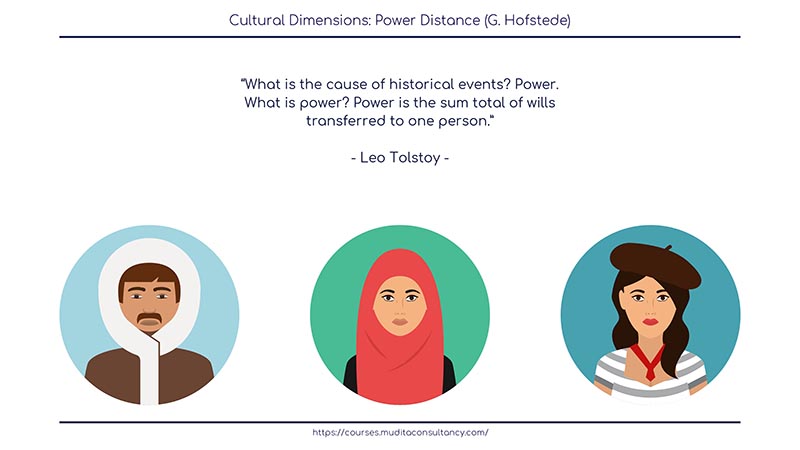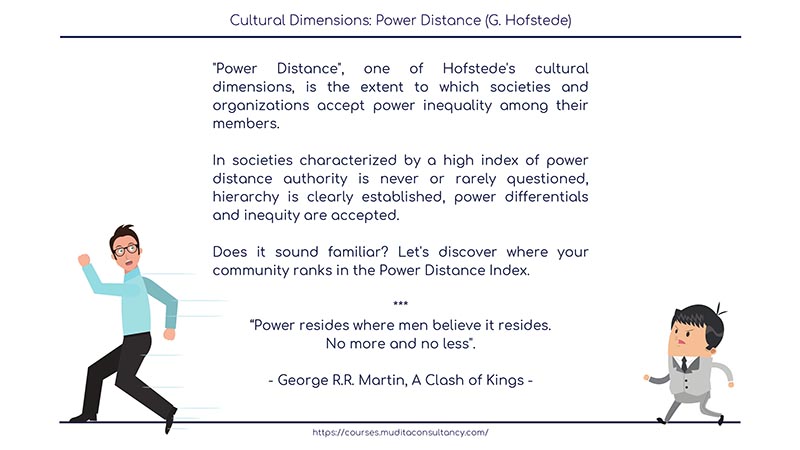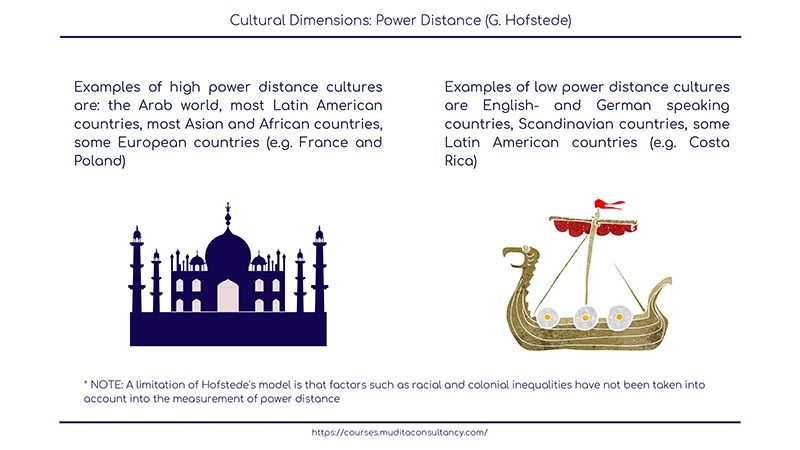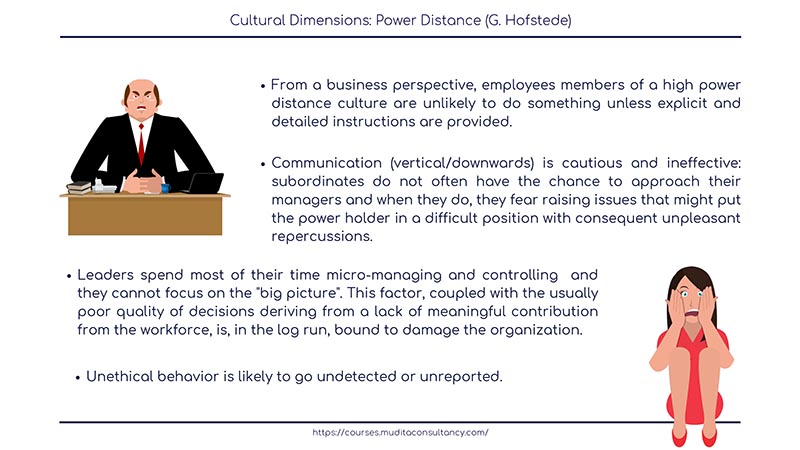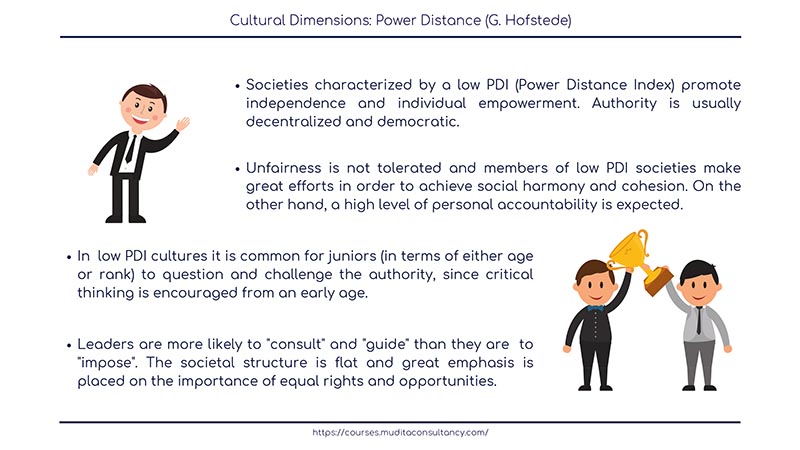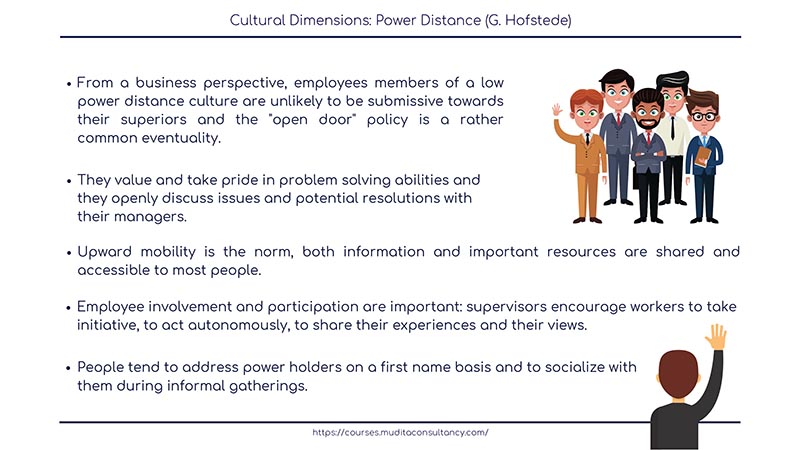Power Distance
Nearly all men can stand adversity, but if you want to test a man's character, give him power.
- Abraham Lincoln -
"Power Distance ", one of Hofstede’s cultural dimensions, indicates the extent to which societies and organizations accept power inequality among their members. In societies characterized by a high index of power distance authority is never or rarely questioned, hierarchy is clearly established, power differentials and inequity are accepted.
Examples of high power distance cultures are found in the Arab world, most Latin American countries, most Asian and African countries, some European countries (e.g. France and Poland), while low power distance cultures can be found in English- and German speaking countries, in Scandinavian countries, in some Latin American countries (e.g. Costa Rica).
[*NOTE: A limitation of Hofstede's model is that factors such as racial and colonial inequalities have not been taken into account into the measurement of power distance].
In societies characterized by a high PDI (Power Distance Index) :
- Authority is usually centralized and autocratic, clearly distinguishing between leaders and followers, with both parties endorsing such level of inequality;
- Hierarchy is normal and accepted, there is an emotional distance between individuals believed to be at different social levels;
- People depend to a large extent on "power holders". Subordinates are not empowered and are expected to take orders, not to act or think independently. They refrain from expressing disagreement and accept to comply without questioning the situation;
- Power holders are entitled to special treatment are are not usually approachable to their subordinates;
- From a business perspective, employees members of a high power distance culture are unlikely to do something unless explicit and detailed instructions are provided;
- Communication (vertical/downwards) is cautious and ineffective: subordinates do not often have the chance to approach their managers and when they do, they fear raising issues that might put the power holder in a difficult position with consequent unpleasant repercussions;
- Leaders spend most of their time micro-managing and controlling and they cannot focus on the "big picture ". This factor, coupled with the usually poor quality of decisions deriving from a lack of meaningful contribution from the workforce, is, in the log run, bound to damage the organization;
- Unethical behaviour is likely to go undetected or unreported.
On the other hand, in societies characterized by a low PDI (Power Distance Index):
- independence and individual empowerment are encouraged. Authority is usually decentralized and democratic;
- unfairness is not tolerated and members of low PDI societies make great efforts in order to achieve social harmony and cohesion. On the other hand, a high level of personal accountability is expected;
- it is common for juniors (in terms of either age or rank) to question and challenge the authority, since critical thinking is encouraged from an early age;
- leaders are more likely to " consult" and " guide " than they are to "impose ". The societal structure is flat and great emphasis is placed on the importance of equal rights and opportunities;
- from a business perspective, employees members of a low power distance culture are unlikely to be submissive towards their superiors and the " open door " policy is a rather common eventuality;
- people value and take pride in problem solving abilities and they openly discuss issues and potential resolutions with their managers;
- upward mobility is the norm, both information and important resources are shared and accessible to most people;
- employee involvement and participation are important: supervisors encourage workers to take initiative, to act autonomously, to share their experiences and their views;
- employees tend to address power holders on a first name basis and to socialize with them during informal gatherings.
***
Examples of low PDI cultures are those based in the Anglo-, in the Germanic Europe-, and in the Nordic clusters, while examples of high PDI societies can be found in the Eastern Europe-, in the Latin America-, in the Southern Asia-, and in the Confucian Asia clusters [to varying extents].
Articles explaining the impact of Power Distance (with regard to hierarchy, authority, and perceived “social standing”) on social dynamics can be found at the following links:
SOURCES
Hofstede’s Cultural Dimensions (Individualistic vs collectivist cultures)
- Hofstede, G. H. (1997). “Cultures and Organizations: Software of the Mind”. New York: McGraw-Hill
Culture Clusters
- House, R. J., Hanges, P. J., Javidan, M., Dorfman, P. W., & Gupta, V. (2004). "Culture, leadership, and organizations: The GLOBE study of 62 societies". CA: Thousand Oaks
Disclosure: This post contains affiliate links. If you decided to buy any of the products listed here, I would earn a small commission (at no additional cost to you).
***
